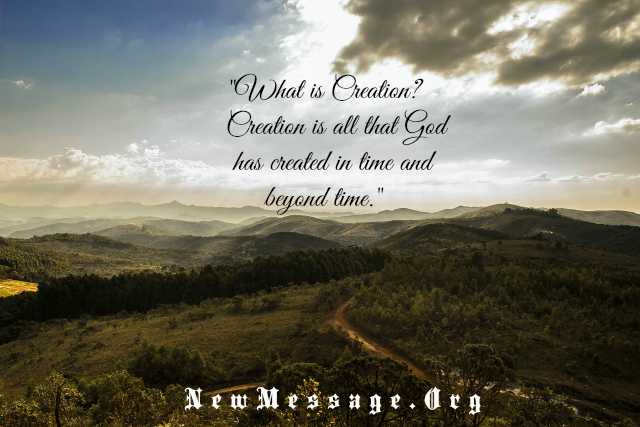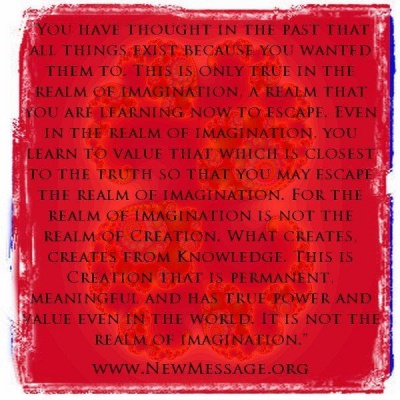Difference between revisions of "Creation"
| Line 29: | Line 29: | ||
[[File:Realm_of_creation.jpg|left|400px|realms]] | [[File:Realm_of_creation.jpg|left|400px|realms]] | ||
| − | ==The | + | ==The Permanent Creation== |
"You have thought in the past that all things exist because you wanted them to. This is only true in the realm of imagination, a realm that you are learning now to escape. Even in the realm of imagination, you learn to value that which is closest to the truth so that you may escape the realm of imagination. For the realm of imagination is not the realm of Creation. What creates, creates from Knowledge. This is Creation that is permanent, meaningful and has true power and value | "You have thought in the past that all things exist because you wanted them to. This is only true in the realm of imagination, a realm that you are learning now to escape. Even in the realm of imagination, you learn to value that which is closest to the truth so that you may escape the realm of imagination. For the realm of imagination is not the realm of Creation. What creates, creates from Knowledge. This is Creation that is permanent, meaningful and has true power and value | ||
even in the world. It is not the realm of imagination." | even in the world. It is not the realm of imagination." | ||
| Line 37: | Line 37: | ||
<ref name="creation"/> | <ref name="creation"/> | ||
| + | ==No Alternative to Creation== | ||
| + | |||
| + | "There is no [permanent] alternative to Creation. | ||
| + | The physical universe is an alternative to Creation, and that is why it is changing and moving, for it has a beginning, a middle and an end. You are somewhere in the middle in the great span of Creation. Only a very small part of Creation is involved in manifest life. But to you, of course, it is immense and incomprehensible, as it should be. It is not possible for your intellect to comprehend the scope and the magnitude of this." <ref>[http://www.newmessage.org/the-message/volume-1/one-god/the-origin The Origin (November 18, 2009)]</ref> | ||
==References== | ==References== | ||
Revision as of 21:46, 4 August 2016
"'What is creation?' Creation is all that God has created within time and beyond time." [1]
"Humanity is not the centerpiece of the Creation, only one of its developing aspects. This represents a tremendous breakthrough in understanding. This represents a great threshold in self-realization and the ability to effectively engage with the world." [2]
Physical evolution
"The world is driven by powerful geologic and biologic forces. They were set in motion at the beginning of the physical Universe. God has set them in motion to operate on their own, moving in a certain direction." [3]
“For you, Creation is the physical universe. It seems to be forever, but it is really temporary. It has a beginning, a middle and an end. You have not even reached the middle spot of this expanding universe, so this is something that is confounding to your understanding.” [1]
"You must see that God is not operating all the functions of the world, for these were set in motion at the beginning of time. There is no conflict here between creation and evolution. And there is really no conflict between religion and science." [4]
“The great gulf between you and God must be filled in with reality. The assumption is always made that there is you and there is God, and you are small and God is great. But between you and God is all of life’s evolution—an expanding network of relationships. It is through this network that you must pass.” [5]
The Plan to end Separation
"You live within time, so you live in part of creation that is in motion, that is in flux, that is unstable, that is evolving and expanding. This part of creation was established to provide a home for the separated where they could experience separation and have the opportunity to choose a way to return to that part of creation that does not change, that is complete and eternal." [1]
“Creation is complete, and your temporary experience in this temporary reality that you call the physical universe is but a tiny part of God’s permanent Creation, a Creation that you cannot yet experience clearly for yourself, even though you might have glimpses here and there.” [1]
The Permanent Creation
"You have thought in the past that all things exist because you wanted them to. This is only true in the realm of imagination, a realm that you are learning now to escape. Even in the realm of imagination, you learn to value that which is closest to the truth so that you may escape the realm of imagination. For the realm of imagination is not the realm of Creation. What creates, creates from Knowledge. This is Creation that is permanent, meaningful and has true power and value even in the world. It is not the realm of imagination." [6]
“You are already surrounded by the permanent Creation, but your eyes cannot see it, your ears cannot hear it, and your fingers cannot touch it because your senses were only established to recognize physical things and things that are moving—objects that are moving and sounds that are changing. The greater reality in which you live is all around you. You have never left it, but given your reliance upon your senses, you cannot experience it directly without a certain kind of preparation.” [1]
No Alternative to Creation
"There is no [permanent] alternative to Creation. The physical universe is an alternative to Creation, and that is why it is changing and moving, for it has a beginning, a middle and an end. You are somewhere in the middle in the great span of Creation. Only a very small part of Creation is involved in manifest life. But to you, of course, it is immense and incomprehensible, as it should be. It is not possible for your intellect to comprehend the scope and the magnitude of this." [7]
References
- ↑ 1.0 1.1 1.2 1.3 1.4 What is Creation? (Feb. 4, 2007)
- ↑ Wisdom from the Greater Community Volume Two, Chapter 10
- ↑ Nature and Natural Disasters, September 8, 2008
- ↑ The New God (Feb. 12, 2009)
- ↑ Wisdom from the Greater Community Volume One, Chapter 17
- ↑ Steps to Knowledge, Step 351
- ↑ The Origin (November 18, 2009)
Further Study
What is Creation? (Feb. 4, 2007)
The Origin (November 18, 2009)

